Translation by Yuzuland, thanks for helping Yuzuru fans who do not speak Japanese.
Tradução feita por Yuzuland, obrigada pela ajuda aos fãs de Yuzuru que não falam japonês.
Big improvement in 2012/13 Season
K: After you changed your coach to Brian Orser, you had many competitions. You participated Four Continents and won Japan Nationals first time. And then it is grand prix.
Y: I changed [my coach] to Brian in the year of 2012 Grand Prix. In the first event of Grand Prix, I marked the world record [at the time] for short programme (95.07 at GP Skate Canada and 95.32 at NHK Trophy) and that made me famous.
K: You were quite famous already.
Y: That was a surprise for me too. It was shocking. The jumps in my short programme might have been perfect but many other aspects of the programme were not. With that performance that I wasn’t satisfy with, I felt like “90? eh? 95?? Should’t it be 85?” It was quite surprising. At that time, Patrick would get 92 or 93 when he has a clean programme. So 90 points is like another dimension. So I was surprised that I got [that mark].
K: But you got it.
Y: Yeah I got that mark. But the free was horrible though.
K: Opposite from how you were [in previous seasons].
Y: Yes. From that season, the pattern became “having a good short and a horrible free”.
K: But the best short programme performance was the last exhibition of the last competition, right?
Y: Yeah. I had my first clean programme in exhibition. In that season, I didn’t have a clean performance other than exhibition performances.
K: (laugh)
Y: The free in Grand Prix Final was almost clean. But I was so tired before the lutz, I didn’t think I could jump it.
Base Value
K: How do you maintain your motivation when you feel like you cannot land the jumps.
Y: I will be like I’m gonna jump anyway. I will take the base value of the jumps anyway.
K: It is important to have those base values points.
Y: After the accident in Cup of China, I thought I cannot pop any jump so I had to rotate all the jumps anyway. I thought I could fall on those jumps. I have to rotate all those jumps even if I’m gonna fall on them. I don’t care about the -3 [GOE] or the deduction, because with the -3 and the deduction, it will only be -4. If I can rotate a quad salchow, which has a base value of 10. something 10.5], then I can get around 6. So I just had to keep on rotating all those jumps.
K: Base value is important.
Y: Yes it is important.
2014 Cup of China, the accident during 6 minutes warm up
K: I don’t know if I should ask it, but were you fine when you collide [with Han Yan]?
Y: I wasnt fine after the collision. People always asked me “were you fine [at CoC]?” my response was “if I was fine, then I would have skate properly.” I couldn’t move my legs at all so I had to leave with a wheel chair. I am also amazed by how I could rotate all those quads and skate for 4 and half minutes.
K: Maybe you thought of the base values in the back of your mind.
H: (laugh). I did actually think about the base value. [I thought] if I rotate the jumps then I can get the points so I have to rotate as many jumps as possible. I thought I would nail at least axel.
2014 Cup of China the situation after the collision
K: (point to Hanyu’s chin) There?
Y: I bled mostly from here. This wound was the biggest and bled a lot from here. And this side [of my head]? this side or that side, I forgot, also bled. Maybe I hurt the side of my head when I collided with the skater Han Yan, I don’t know.
K: The amount of blood was scary. But that’s it?
Y: Yes. I didn’t cut the back of my head. My chin was hit by the ice. But that’s it. And the wound in my head was just because of the collision.
K: So your head was fine [as in you don’t have a concussion]?
Y: I didn’t feel like my brain was shaking. I thin I felt my brain shaking a few times before.
K: What?
Y: When I was small, after I got onto the podium in a novice competition, I thought I could go to olympics [and jump 3A] and I was like “I could jump and land everything”. So I went to practise 3A even though I couldn’t land a perfect single triple back then. So I thought I could just delayed* my 2A…
K: Delayed?
Y: When you open up and then go back to a tight position..do you know? Split [the jump]? When I tried to do my 3A, I landed on my ankle and my head hit the ground and I wasn’t conscious after that. Sometime after that I was moved to a warm room and I couldn’t move my arms and legs.
2014 Cup of China the truth behind that collision
K: Take care. so when you had the collision in CoC…
Y: My head was fine. Right before the collision I was doing a three turn, forward facing with my left foot. So [when we collided], my left foot was turning to the back and the other skater’s knee just came straight [to my inner thigh]. I was skating with my left foot but my left foot also left the ground. But my right foot wasn’t touching the ground either so I thought “Ah what should I do” while I’m in the air. My head hurt and I thought “oh crap” and I landed on my stomach. I landed on my stomach so my stomach hurt a lot. Every skater must have experienced this. (K: Can I guess? [You fell on your stomach when you were practicing] Flying camel [spin]?) Ah no…Sometime you fall on the front when your toe is caught by the ice. (K: No matter how good a skater you are) Everyone must have experienced when they were small. So when it is with the fastest speed and you collide, your stomach hurts so much that you can’t breathe. [The collision in CoC] was like that but 20 times.
K: I can’t imagine that! You couldn’t even move [after the collision].
Y: At first, I was still conscious so I tried to stand up. But when I tried to stand up, my stomach hurt so much and my muscles were contracting so I couldn’t lift up my back and I had to bend down. But that position was very painful so I had to lie down. I remember myself thinking “can they blow the referee’s whistle, ah everyone is practicing but it hurts”. Then the Chinese medical team came over and brought a stretcher over. They asked me if I was fine and if I could walk. I told them “I’m fine, I don’t need that [stretch]. I can just leave [the rink] normally.”
K: It’s good that you didn’t hit your head.
Y: I’m glad that it isn’t my head. Although I had bleeding from here [chin] to here [the side of his head], I didn’t have much blood coming out from the head. It was the bleeding from the chin that was quite serious.
K: It was good that it wasn’t your head. It could have been a concussion.
Y: I didn’t have a concussion. An American doctor came immediately afterward to treat my wound. Brian was worried about me so he was talking to the doctor in English. They asked me in English, what is 100 minus 7, wait it was harder than that, something like 100 minus 7 and then minus 7. And it was after all the panic and I hit my head and my chin, so they had to check I don’t have a concussion. But they asked me such a hard question and I had to answer in English so I was like “huh huh???”
K: It is difficult even in an everyday life.
Y: So I remember that really well. I was like “I can’t answer that.” But I was conscious so I told them I’m fine. My eyes were fine too. I bled a lot and my chin swelled up because of the wound. But my knees and thighs hurt so bad.
Sit spin was the most painful part of the programme
K: So you hurt your muscle [after your collision]
Y: It felt like my muscle was taken from me. It was like the pain when you pulled your muscle. Here [the thighs] is the most painful part because you have to use that muscle for everything. Sit spin was more [difficult and] hellish than the jumps.
K: (laugh)
Y: I was quite conscious during that competition.
K: Yeah. Sit spin seems to hurt a lot, especially when your thighs hurt.
Y: You always have to endure [the pain when you do] the sit spin. When it is jump, it was like a quick deal.
K: So when you land, it is your right leg.
Y: Sit spin was hell. So from what I remember, I fell on the salchow, I fell on the toe loop, I landed the flip and then I went into the combination jump. Then I remember thinking “I don’t want to do the sit spin, can I still stand after the sit spin.”
K: Like you’d sit after your sit spin.
Y: It is like sitting after my sit spin.
K: I wasn’t aiming to be funny.
K+Y: (laugh bitterly)
K: Can I just talk about this for a bit?
Y: Go ahead.
K: I was doing a sit spin when I was choreographing one time. I was spinning quite fast and when I tried to stand up, I strained my back. (Y: (laugh)) It was about 3 years ago. I was in [half sit half stand up] position and I couldn’t move so I just sat down as the spin slowed down.
Y: How did you stand up in the end?
K: Tomo-kun came over and helped me. And we went to hospital after that and it was okay. I only said that [joke] because I remember this incident. I wasn’t aiming to be funny.
Y: But the story you just told…wasn’t that funny. The reaction [of the staff] is “…” [no reaction]. (K: here you come with you witty comment [tsukkomi]) I was laughing so hard just now because I could imagine how it would look like, I know because you choreographed for me before. But the staff don’t about that…so the reaction is…[inexistent].
Do you have any elements that you are not good at?
Y: …Lutz? I’m actually not that bad at jumping lutz.
K: I know.
Y: I’m no that horrible at lutz, even though I gave the impression that I’m bad at it. I was very bad with the jumps (a long long time ago :P)
K: All of the jumps?
Y: All of them. I suck at all the jumps. But I like axels so I practised axels all the time. But I couldn’t land those jumps, but people around me could.
K: You hate to lose right?
Y: Yeah. I was aware that I was bad at jumps. Although it’s not elements but when it was Worlds junior, I suck at short programme, even though I’m good at free. But after I got Parisienne walkway, I became good at short but bad at free.
K: Keep on eliminating [your weaknesses].
Y: If I improve on something, I will start to think I suck at the other aspects that I have yet to improve on. Basically it’s not like I cannot do something. But sometime I do get a bit clumsy and not so good at it.
K: Do you look at other skaters when you practise?
Y: I look at them a lot. I stare at them. I won’t look right before my performance during a competition. But during other time, like practise time, then I will look at them.
K: What do you look for when you observe them?
Y: How they jump. (K: So you analyze how they jump?) Yes and also the movement of their hands. I didn’t study dance so I learn a lot from the way they use their hands and the music, for example from Jeff in his choreography video.
Ideal figure skating
K: After seeing different skaters, What is your ideal figure skating like?
Y: My ideal figure skating is…figure skating has both jumps and spin, which are the athletic part [of the sport] and the skating skill, expression, steps, which are like ballet, artistic part of the sport.
I want my programme to be a figure skating programme, not entirely artistic [or entirely athletic]. You would know ‘cause I have said that to you before, but whenever people choreographs for me, I always tell them “I want to express spins and everything”. Also, I want to match with the songs. I feel disgusting if I don’t. For example, the timing of the jump or the timing before I go into a jump. I want those to be in the music or in the content of the programme. I always pay attention to not separate skating from expression.
K: Oh yeah, like the beginning of your last season’s short [Ballade no.1]
Y: Yes (laugh). Jeff wanted me to close my eyes but I was so nervous at first so I couldn’t close my eye because my eyes kept moving. So I [*stare at the ground*]. And I could also do my imagine training then. During that time I just think about the [quad] toe loop. Something like I can land if I jump like this.
K: After watching that, I said it is better to close your eye.
Y: And I started to close my eyes after that. I closed my eyes during my practise too.
K: I was worried about [you opening the eyes during that time], it suits the music better if you close your eyes. Jeff must have spent a long time planning that beginning, is it 15, 16 seconds?
Y: Um 17…at least 15, 16 seconds.
K: It is hard to close your eyes that entire time, right? I shouldn’t have told you that [you should close your eyes]. I was worried that you won’t be able to orientate after shutting your eyes for so long. But if you also do it in practise then it’s fine.
Y: Yes. I thought that would be the case. When I’m not in my good condition, I only have horrible image [during my imagine training] when I’m in a competition. So I “input” [the image of] how I jump and land at a specific timing in the music into my brain. When the music starts playing only that image will be in my mind. With the same length.
K: Oh.
Y: Everything is in sync with every note of the music. For example, I will do a cross over from this part to that part [of the music], and then I will do an eagle, then a choctaw, then go into a toe loop. Every single movement, although it’s not choreography moves, it is in sync with the music.
K: So you stand there, close your eyes and imagine. What if you screw up in your imagination?
Y: I practiced not to have that [situation]. Practise for imagine training.
Imagine training is like choreography
K: Imagine training** is fun.
Y: Imagine training is part of the performance [in the competition], it’s like choreography. [You are thinking] “cross over at this point and make an eagle”. It’s just that you are not moving your body. I imprint [the imagination of] my body moving at a certain timing of the programme onto my mind.
K: You imprint it onto your mind. That programme is really cool.
Y: I also like it very much.
K: The emotion varies over the duration of the programme.
Y: Because it is a classic. I told you when you were choreographing for me, but classic doesn’t have lyrics and background to it [so it is not restricted by lyrics or background]. It allows you to fully express your emotional the time, nerves, and your true self.
K: I’m choreographing a new programme. I’m listening to the music and I find it interesting that the music seems to just choreographs itself. You pay a lot of attention to every element, like you want to do this with your spin.
Y: I think this starts when Kenji, you choreographed Hana ni Nare for me. I wanted to end the programme with a spin that I’m good at, but you said [that spin] closes into itself, it is not blossoming. (K: Did I say that?) Yes, and you said “that would be a bud. Open your arms at the climax in the end” For example, with the pancake [spin], I remember you told me that “this would be very small, you have to make it bigger”. After that, I realised that I shouldn’t just do the moves that I’m good at; I should follow the music and choreographs according to it.
K: Oh I don’t know why but thank you for complimenting me.
Yuzuru Hanyu’s strength, according to Kenji
K: When was this… I thought you were really good when you were doing your skating practise. If I told you to pay attention to this bit and that bit, you would just keep on practising. The rink was quite cold but you came over sweating and said “I have worked on it for a bit, what do you think?” And you actually fixed the priblem. And if I told you it’s not enough, then you will keep on practicing. After that you would come over and tell me you’ve worked on it and ask for my opinion. This just keeps on going, as long as I say there’s something to improve on.
Y: You can’t stop after you started to pay attention to one bit [of the programme]. I want it to be complete. It is not like it’s OK if you just pay attention to it. Same for jumps, it is not only about landing the jumps. But also how to jump beautifully and how to jump without using a lot of energy. I’m very fussy about this. I think I’m more fussy about skating than most people. It’s not specific to expression, step, jump or spin individually. I’m fussy about all of those elements.
K: Speaking of things that you are fussy about, then we can talk about it a long time
Y: I think we can talk for a long time (K: Nevermind then.) I can start from warm up.
K: I can also talk about warm up, like I want to warm up by doing some sports…let’s stop here.
Y: Let’s stop here.
*Thank you for telling me it is “delayed”! :)
** Direct translation would be “image training” but I thught imagine training would be more descriptive… :D Thank you yuzusorbet for pointing it out :)))
Algumas fotos tirados do vídeo:
Foram bem interessantes as perguntas de Kenji sobre a colisão de Yuzuru, esclareceu muitas dúvidas que o público tinha sobre esse acidente.Eu tremo cada vez que vejo imagens desse episódio e depois de ver Yuzuru descrever o que ocorreu só tenho a agradecer por ele sair ileso.Tenho certeza que todos admiradores de Yuzuru torcem para que ele se de bem nessa temporada, mas principalmente rezam para que ele não sofra nenhuma contusão e/ou acidente como na temporada passada.
Video of this talk can be viewed here.
Read more: JSPORT
Tradução feita por Yuzuland, obrigada pela ajuda aos fãs de Yuzuru que não falam japonês. - See more at: http://yuzuruhanyubr.blogspot.com.br/search?updated-max=2015-09-22T00%3A01%3A00-03%3A00&max-results=3#PageNo=2
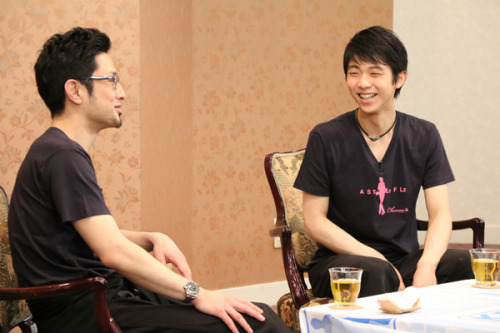
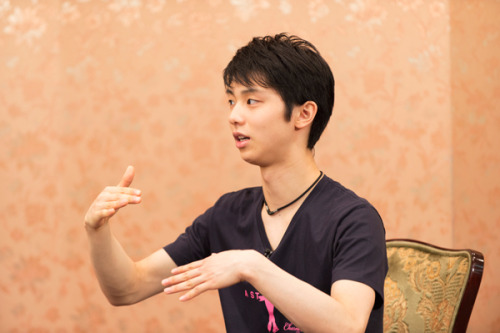
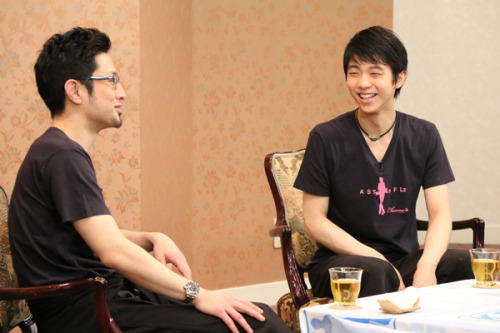
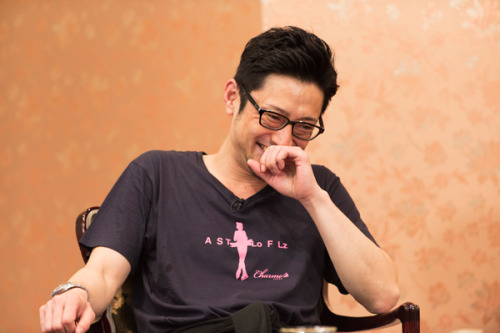
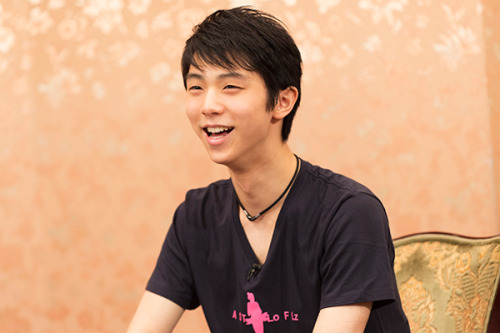
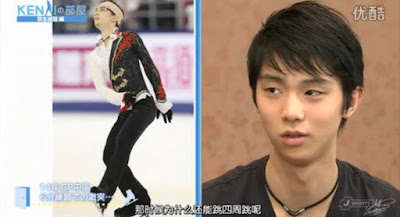










0 comentários:
Postar um comentário